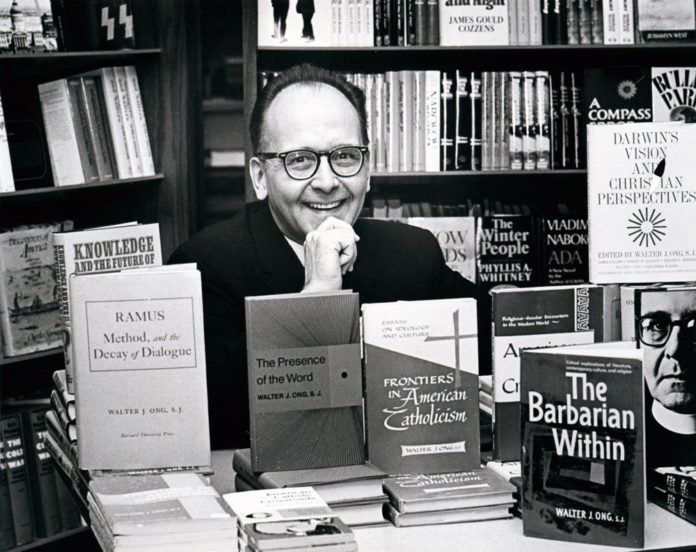
Known for his work in Renaissance literature, intellectual history, and the evolution of consciousness, Walter J. Ong, S.J., was a Jesuit, a scholar, and a teacher. An author of over 450 publications and the perennially popular Orality and Literacy, Fr. Ong was a Saint Louis University Professor Emeritus, the William E. Haren Professor Emeritus of English, and Professor Emeritus of Humanities in Psychiatry. His scholarship has influenced numerous fields and countless scholars.
Walter Jackson Ong was born November 30, 1912, in Kansas City, Missouri. He completed undergraduate studies at Rockhurst College and worked in commercial positions for two years before entering the Society of Jesus in 1935. He then studied philosophy and theology at Saint Louis University, received his master’s degree in English at Saint Louis University and his doctorate at Harvard University. Saint Louis University was among the many institutions to recognize Ong, bestowing him with its highest honor, the Sword of Ignatius Loyola, in 1993.Ong collageFr. Ong’s scholarship was recognized around the world. His seminal Orality and Literacy was translated into a dozen languages, both European and Asian. He gave lecture tours in Western Africa, Japan, and across Europe. Although they seldom honor teachers of English, the French Government named him Chevalier dans l’Ordre des Palmes Academiques.
Fr. Ong’s advice was sought across several fields of expertise. He served on the editorial boards of a number of academic journals, was a member of various national committees for the Modern Language Association, the National Endowment for the Humanities, and the American Council on Education, and served as President of the Milton Society of America and the Modern Language Association. In 1967, he served on the 14 member White House Task Force on Education under President Lyndon B. Johnson.
Fr. Ong’s work was deeply interdisciplinary, a fact recognized by Saint Louis University in 1984, when Ong was appointed University Professor, a unique placement directly under the University’s central administration, reporting to no departmental chair or dean. His teaching and writing was difficult to classify by traditional lines of departmental demarcation. His students labeled his courses not English but “Onglish” to explain his vast treatment of topics in any class. He explained in a letter that he did his graduate work in English because “English seemed intellectually and culturally roomier and more open than other subjects. It could encompass what they did and more — could open the way into almost anything.”
A Jesuit Catholic priest, Walter J. Ong, SJ, was active in the ministry after ordination in 1946. For decades he celebrated daily Mass in St. Francis Xavier (College) Church in St. Louis, MO, and administered there and elsewhere the sacrament of Reconciliation. He regularly directed others in the Spiritual Exercises of Saint Ignatius of Loyola, in various forms: in groups and in one-on-one individual direction. At North House, a former Jesuit residence in St. Louis, he contributed to the free tutoring for young boys needing academic assistance. He also cared steadfastly for every houseplant in Jesuit Hall.
Fr. Ong was active until the end of his life. His last article, “Digitization Ancient and Modern: Beginnings of Writing and Today’s Computers,” published in 1998 in Communication Research Trends, won the Media Ecology Association’s Walter Benjamin Award for Outstanding Article in the Field of Media Ecology in 2000. Fr. Ong died in 2003.

















